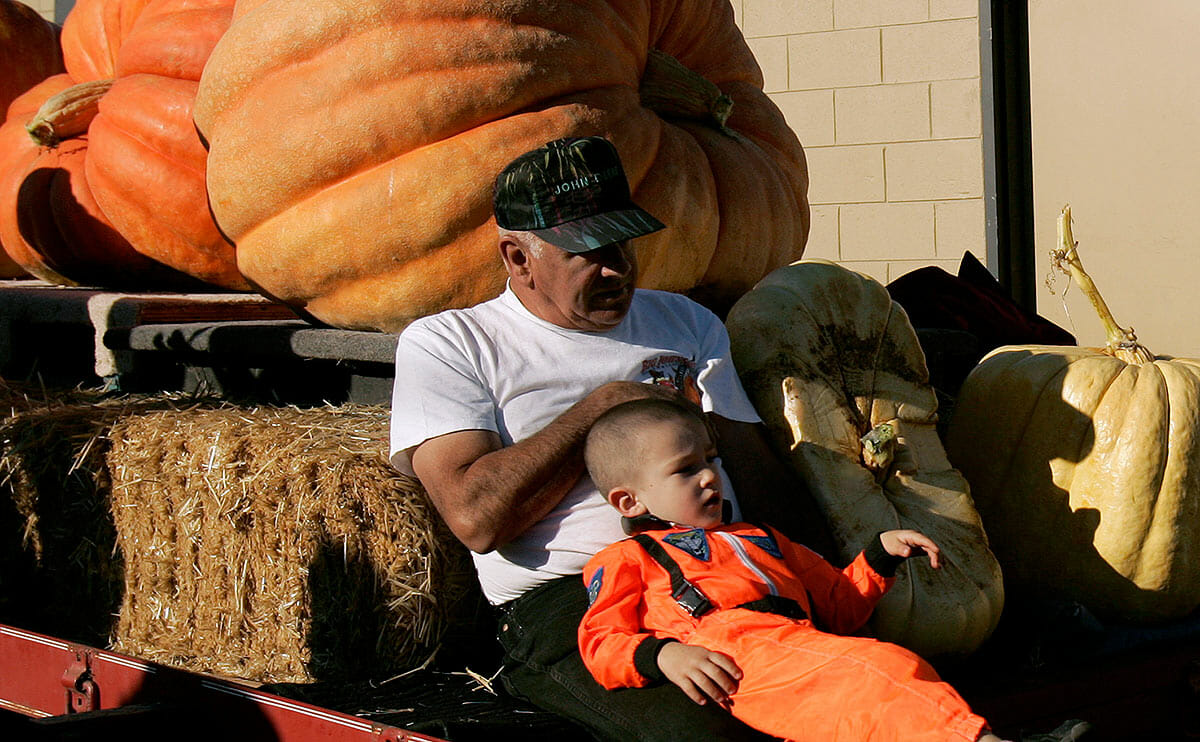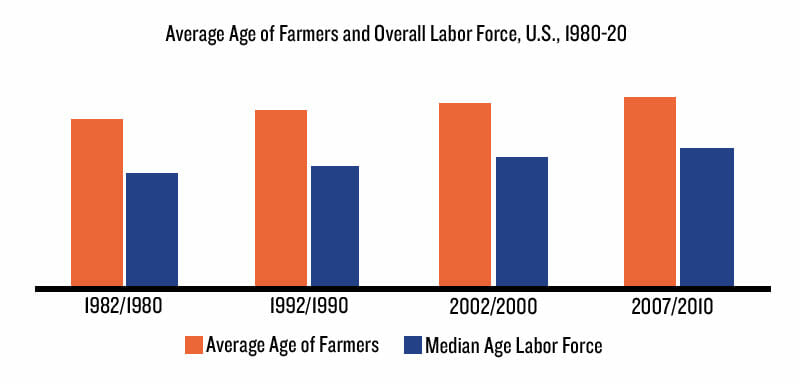Study: Stop Freaking Out About Aging Farmers
Yes, the average age of farmers has gotten older. But so has the average age of almost every type of worker.
Study: Stop Freaking Out About Aging Farmers
Yes, the average age of farmers has gotten older. But so has the average age of almost every type of worker.

A 2007 census of the America farm workforce raised cause for concern. In that year, the American farmer was 57 years old and only .5 percent of the workforce was under 25. Over 500,000 farmers — half of the agricultural workforce — was primed to retire in the coming decade. With only a few young aggies ready to take the reins, some predicted family farms would fall to larger operations or real estate developers.
Carl Zulauf, a professor at Ohio State University’s College of Food, Agriculture and Environmental Sciences, looked at the data after being asked about the coming labor crisis. His study shows U.S. farmers are getting older, but not at a greater rate than the rest of the American labor force. Further, farmers have been older than everyone else since the 1980s.

“U.S. farmers are aging,” he writes in the study, “but their aging mirrors the rest of the American labor force.”
He finds those facts to be consistent with farming as a capital intensive industry. Unlike building an app or opening a cupcake shop, jumping into agriculture takes an enormous amount of cash, land and intellectual capital. The traditional methods farmers use to raise that capital — either hard work, inheritance or both — take time.
‘U.S. farmers are aging, but their aging mirrors the rest of the American labor force.’
Zulauf even found reason to be cautiously optimistic about the future of agriculture. His historical examination of the age of American farmers revealed the 1970s — an decade of relative farm prosperity — held a brief period where the age of the average American farmer actually declined. The U.S. hasn’t seen a similar good times until, well, now.
“You have to realize that the longer you have above average returns, the more likely you are to pull people in,” says Zulauf. A new round of census data won’t be out until next year, but Zulauf has noticed an increasing number of his students discussing the idea of making a go in agriculture.
While that hope is based on the economic assumption that workers enter profitable industries, it depends on continued farm prosperity. Organizations like the National Young Farmers Coalition have pushed for policy shifts that would make agriculture much more welcoming to young entrepreneurs. For instance, the government could forgive student debt for young farmers as they do for teachers, physicians and government employees. Loan and training programs could further lower hurdles for the next generation of American farm owners.
Such programs are all good with Zulauf. “Society can decide that it wants to encourage young people to get into agriculture,” he notes. “But it’s another thing to claim we aren’t going to be able to replace current farmers.”
Follow us
This work is licensed under a Creative Commons Attribution-NoDerivatives 4.0 International License.
Want to republish a Modern Farmer story?
We are happy for Modern Farmer stories to be shared, and encourage you to republish our articles for your audience. When doing so, we ask that you follow these guidelines:
Please credit us and our writers
For the author byline, please use “Author Name, Modern Farmer.” At the top of our stories, if on the web, please include this text and link: “This story was originally published by Modern Farmer.”
Please make sure to include a link back to either our home page or the article URL.
At the bottom of the story, please include the following text:
“Modern Farmer is a nonprofit initiative dedicated to raising awareness and catalyzing action at the intersection of food, agriculture, and society. Read more at <link>Modern Farmer</link>.”
Use our widget
We’d like to be able to track our stories, so we ask that if you republish our content, you do so using our widget (located on the left hand side of the article). The HTML code has a built-in tracker that tells us the data and domain where the story was published, as well as view counts.
Check the image requirements
It’s your responsibility to confirm you're licensed to republish images in our articles. Some images, such as those from commercial providers, don't allow their images to be republished without permission or payment. Copyright terms are generally listed in the image caption and attribution. You are welcome to omit our images or substitute with your own. Charts and interactive graphics follow the same rules.
Don’t change too much. Or, ask us first.
Articles must be republished in their entirety. It’s okay to change references to time (“today” to “yesterday”) or location (“Iowa City, IA” to “here”). But please keep everything else the same.
If you feel strongly that a more material edit needs to be made, get in touch with us at [email protected]. We’re happy to discuss it with the original author, but we must have prior approval for changes before publication.
Special cases
Extracts. You may run the first few lines or paragraphs of the article and then say: “Read the full article at Modern Farmer” with a link back to the original article.
Quotes. You may quote authors provided you include a link back to the article URL.
Translations. These require writer approval. To inquire about translation of a Modern Farmer article, contact us at [email protected]
Signed consent / copyright release forms. These are not required, provided you are following these guidelines.
Print. Articles can be republished in print under these same rules, with the exception that you do not need to include the links.
Tag us
When sharing the story on social media, please tag us using the following: - Twitter (@ModFarm) - Facebook (@ModernFarmerMedia) - Instagram (@modfarm)
Use our content respectfully
Modern Farmer is a nonprofit and as such we share our content for free and in good faith in order to reach new audiences. Respectfully,
No selling ads against our stories. It’s okay to put our stories on pages with ads.
Don’t republish our material wholesale, or automatically; you need to select stories to be republished individually.
You have no rights to sell, license, syndicate, or otherwise represent yourself as the authorized owner of our material to any third parties. This means that you cannot actively publish or submit our work for syndication to third party platforms or apps like Apple News or Google News. We understand that publishers cannot fully control when certain third parties automatically summarize or crawl content from publishers’ own sites.
Keep in touch
We want to hear from you if you love Modern Farmer content, have a collaboration idea, or anything else to share. As a nonprofit outlet, we work in service of our community and are always open to comments, feedback, and ideas. Contact us at [email protected].by Sam Brasch, Modern Farmer
January 3, 2014
Modern Farmer Weekly
Solutions Hub
Innovations, ideas and inspiration. Actionable solutions for a resilient food system.
ExploreExplore other topics
Share With Us
We want to hear from Modern Farmer readers who have thoughtful commentary, actionable solutions, or helpful ideas to share.
SubmitNecessary cookies are absolutely essential for the website to function properly. This category only includes cookies that ensures basic functionalities and security features of the website. These cookies do not store any personal information.
Any cookies that may not be particularly necessary for the website to function and are used specifically to collect user personal data via analytics, ads, other embedded contents are termed as non-necessary cookies.